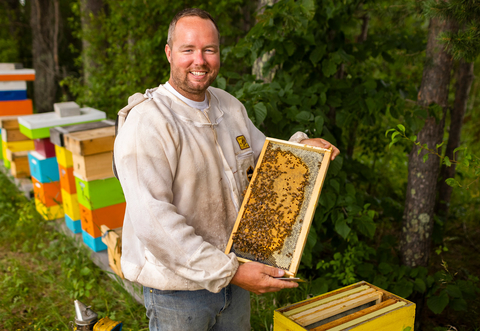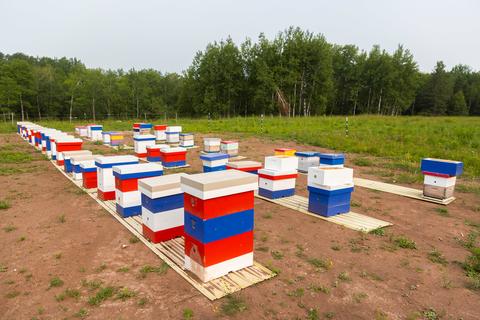Keeping bees enables a unique closeness to nature. For military veterans, beekeeping can be a peaceful and purposeful hobby for life after active duty.
“Beekeeping is rising in interest among veterans. It is an empowering experience, especially once you get into it and are able to work with colonies of thousands and thousands of insects,” says Katie Lee, University of Minnesota Extension apiculture educator. She has witnessed how beekeeping builds community among participating veterans as they learn new skills.
History and hands-on experience
The University of Minnesota’s Bee Veterans program was founded in 2016 in honor of veteran and beekeeper Michael Roche, who believed in the therapeutic benefits of beekeeping.
Since 2016, more than 100 veterans have participated in the program, including Christian Dahm.
“I dabbled in school and took all the fun courses first,” Dahm says, recalling the ecological restoration courses he took at the University of Minnesota Crookston following a seven-year stint in the Marines. He later transferred to the Twin Cities campus where he took a honey bee class after answering an email inviting interested veterans to attend at no cost. It was there, Dahm says, that he found his gateway into beekeeping, an endlessly complex challenge in which there is always more to learn.
“The class was cool, but I wanted to learn more, get some hands-on experience,” says Dahm. “Eventually the Bee Squad hired me for a summer position. It was just what I wanted, and I learned from the best.”
The Bee Squad
The Bee Squad offers a variety of ways to get involved with pollinators beyond its Bee Veterans program. Founded in 2011, the Bee Squad was designed to guide both the public and beekeepers in their efforts to support bee populations in Minnesota, including managed honey bees and over 450 species of wild bees. Extension educators and other University members are working together with scientists, youth, artists and the public to promote the conservation, health and diversity of all bee pollinators.
New career paths
Today, Dahm breeds winter hardy bees, keeping some of his many colonies on the certified organic Food Farm in Wrenshall. After another winter or two, he will be confident marketing those bees as winter-hardy to customers who want to use locally adapted bees.
Dahm’s goal is to eventually make beekeeping his full-time job. To be successful, he said, a beekeeper must be 100% in the moment while with the bees, but also do a lot of planning. “To manage these bees correctly, it not only takes thinking outside the box but thinking months ahead at the end of each day.”



